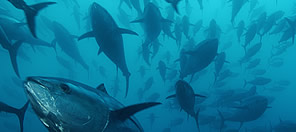A stricken and leaking fishing boat in Bali is further proof that fishing activities in the Coral Triangle urgently need tighter management and controls, WWF said today.
The 30-metre Taiwanese vessel was discovered floundering on a Balinese reef off Padang Padang beach last week. Reports suggest the vessel has already leaked some oil while looters have emptied the holds of tuna and shark, believed to have been caught illegally.
“The fact that no-one knows anything about this vessel or where its captain and crew are is further evidence that unregulated fishing is a problem in this environmentally sensitive area,” said the leader of WWF’s Coral Triangle program, Lida Pet Soede.
The area known as the Coral Triangle covers 5.4 million square kilometres of ocean across six countries and is considered the most important marine biodiversity site on the planet.
The area has been likened to the Amazon rainforest and the Congo basin for its richness of species and for the role it plays in maintaining the health of the planet’s marine ecosystems, and it directly sustains the lives of nearly 130 million people.
Unregulated and illegal fishing activities pose major threats to the Coral Triangle’s unique marine biodiversity, and make it impossible to manage fish stocks and ensure vessels are sound and secure from oil leaks.
“The health of the Coral Triangle is critical to the livelihoods of millions of people and it is crucial that adequate management systems are in place to prevent the kinds of scenes we have seen in Bali over the last week, and to reduce the threat of oil spills and overfishing,” Ms Soede said.
WWF is calling on Coral Triangle countries to tighten controls over unregulated fishing and to safeguard environmentally sensitive marine areas against oil spills and overfishing.
“There is a lot that Coral Triangle countries can do to protect their communities against illegal fishing and potential environmental disasters like oil spills. Increased protection of sensitive areas, monitoring of fishing activities, and more accountability for owners of vessels such as the one that has wrecked off Bali will be good for local populations and good for the health of the region.”
An international symposium on coral reefs earlier this month found that around a fifth of the world’s coral reefs had disappeared and nearly half of the remaining reefs were in danger of disappearing within the next 20 years.
“At a time when coral reefs are such serious decline all over the world, it is crucial that we properly manage the Coral Triangle’s unique marine wilderness for the benefit of the whole planet,” Ms Soede said.
WWF is working with other NGOs, multilateral agencies and governments around the world to support conservation efforts in the Coral Triangle for the benefit of all.














